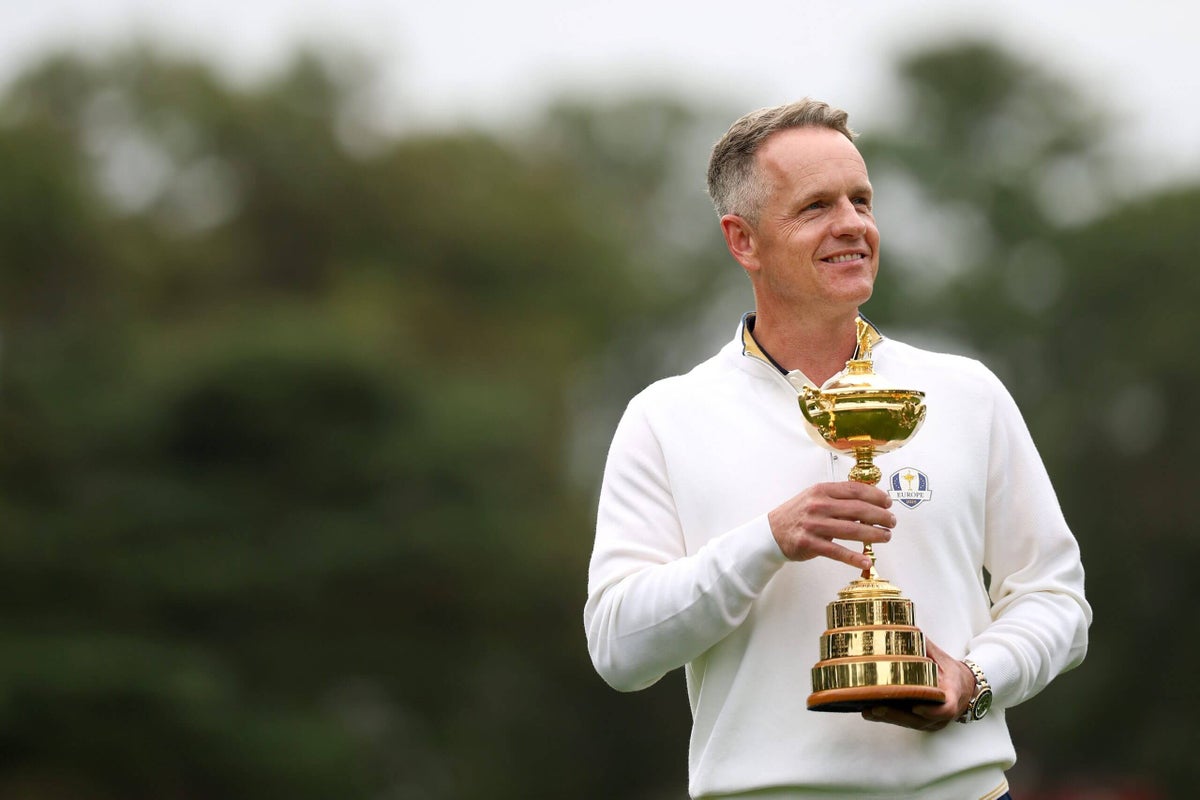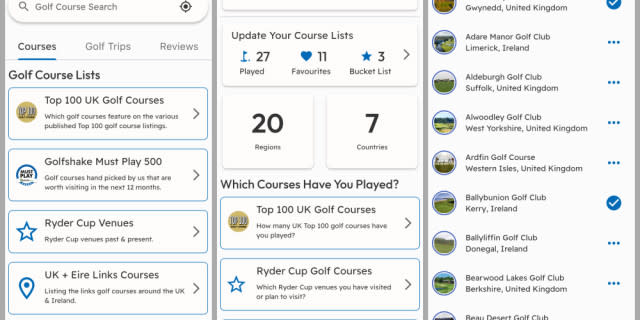The Athletic has live coverage of the 2025 Ryder Cup first pairings and final practice.
FARMINGDALE, N.Y. — To crack the decade-long conundrum of winning a road Ryder Cup, Luke Donald and the Europeans have crafted a new plan, one they’ve deemed the “away template.” Donald is not only responsible for executing that vision. His appointment as the first repeat captain in 30 years is central to it.
If Donald pulls off what has felt like an impossible feat — winning away from European soil — he would shape his legacy into something previously unforeseen. The concept of continuity would define his second administration. But it wouldn’t represent the full story.
Donald is the first returning captain on the European side since Bernard Gallacher in 1995. Eleven of the 12 men from the previous team are on the roster again. The only new face is Rasmus Hojgaard, and he isn’t a new face at all. He was a part of the last cup because his identical twin, Nicolai, competed in Rome.
This is what was envisioned as far back as the victory party at Marco Simone, the European team chanting, “Two more years!” after a runaway win over the Americans. Two months later, they got their wish as Donald was announced to be the captain at Bethpage. The points system and their individual form did the rest, creating a team that feels familiar.
“We have a team that has a lot of continuity, we have a lot of confidence, we have a lot of form,” Donald told The Athletic earlier this month. “We have prior knowledge that as a team we’ve done it before in Rome. I think the guys feel like they’re in a really good spot to take on this difficult challenge.”
The boys are running it back. The leadership looks the same. But everything else? That’s uncharted territory. And that’s how this was all designed.
“This is a very different approach than we’ve ever had before,” says Paul McGinley, the former European Ryder Cup captain and player, and now a Golf Channel commentator. “Luke sees himself as a very different captain than the one that captained at home.”
Keegan Bradley represents the ushering in of a new era of American Ryder Cup captaincy. But when the two sat together a year ago in New York City for the first of many events in the runup to this hotly anticipated Ryder Cup, Donald had that glow — the one of a recently victorious captain still basking in his glory. Donald found himself uniquely back in the same position, ready to face the significantly more ambitious challenge that lay ahead. The lights, the stage, the questions and probes: Donald saw it all coming. After all, following Rome, he never really stopped being the Ryder Cup captain.
“I do feel further along,” Donald said on that October 2024 day. “I’ve gone through it all. I had 14 months to prepare for Rome. Now I’m going to have close to 20 months since they reappointed me.”
Rome was not supposed to be Donald’s turn. The DP World Tour, which runs the European Ryder Cup team, thrust Donald into the position after stripping Henrik Stenson of his captaincy when he defected to LIV Golf. An introvert by nature, Donald wasn’t immediately comfortable with all that came with being captain. And his lead time before the 2023 cup was shorter than desired. But it didn’t matter. Rome was a success. Perhaps Donald’s arc proves everything they say about reluctant leaders.
“Ten years ago, I wouldn’t have said it would be a role that was perfectly suited for him,” Justin Rose said. “I think it’s been wonderful how much he’s grown as an individual and a person through the process. He’s really relished it.”
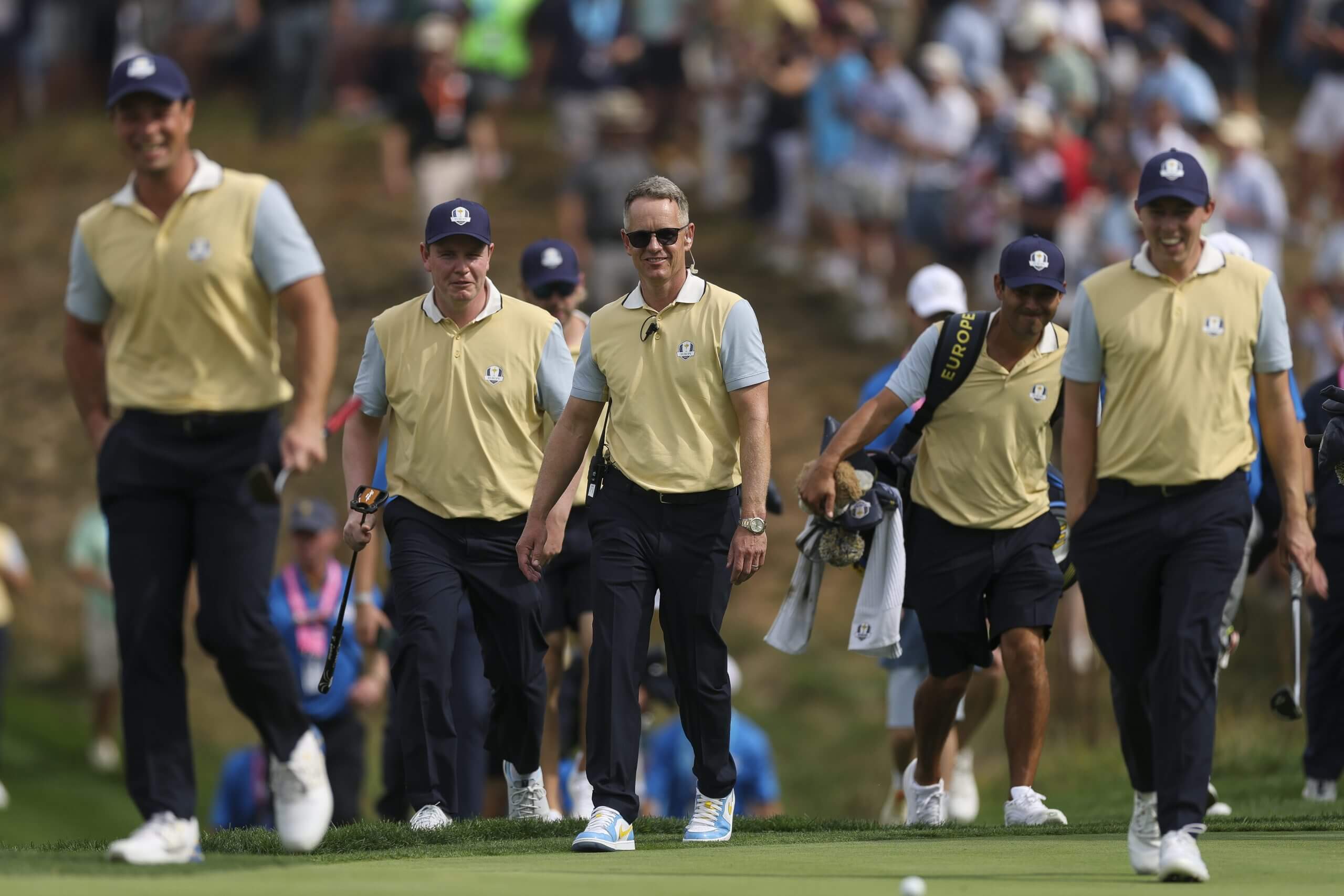
Luke Donald, center, is trying to win a road Ryder Cup for the first time since 2012. (Carl Recine / Getty Images)
Donald led a young, relatively inexperienced team in Rome to a dominant performance, creating a connectivity within the team room that was described as previously unmatched. He did it by helping the players understand their purpose within the Ryder Cup ecosystem, even bringing in performance coach Owen Eastwood, author of Belonging: The Ancient Code of Togetherness, to guide that sort of messaging. Donald brought Eastwood back this year.
“It’s important to make everyone feel like they belong, that everyone has a role, that your place in history is really important, that you get a lot from the people who came before you,” Donald says.
Even as the champagne was still being sprayed that Sunday night in Rome, a select few were already looking ahead. McGinley, a former Ryder Cup captain and player, pulled aside Guy Kinnings, the CEO of the European Tour. McGinley insisted that treating a road Ryder Cup like a home version was a repeated mistake, and it was time for a change.
“The dynamics are very different, and we need to completely shake the tree, and look at this very differently,” McGinley told The Athletic.
In time, the “away template,” as McGinley calls it, would be created, with him serving as a strategic advisor. His first suggestion for executing a redesigned approach to an away Ryder Cup was the establishment of a pillar of reliability in an experienced captain.
Donald, after everything he had proven and all the ways he had grown leading up to Rome, was the man for that job. European Ryder Cup leadership knew it, the players knew it, even Donald himself had an inkling.
“There’s so much learning that happened for Luke and his team in year one, it seems crazy not to take that into year two,” said Rose.
The next step would be the harder one: Donald had to assume the same role but complete an entirely different job.
Bits and pieces of intel about how Donald and the Europeans are approaching this Ryder Cup have trickled out in recent weeks.
Rory McIlroy revealed that the Europeans are utilizing virtual reality headsets to emulate the incessant noise, insults and heckling that they’ll experience on the ground at Bethpage Black. New York sports fans will spare no one. “It’s better to try to desensitize yourself as much as possible before you get in there,” McIlroy said.
The Europeans devised this plan to combat what they believe is the toughest and most unpredictable disadvantage at an away Ryder Cup: the crowd.
“The thing that I’ve given the most thought and energy to is dealing with the environment,” Donald said. “All crowds have energy, and you can use that energy in any way you want.”
Donald sat down with past Ryder Cup captains and players in the last year — especially those who had been a part of away Ryder Cup victories – like Gallacher, Tony Jacklin, Bernard Langer, Ian Woosnam and Nick Faldo.
“Luke played on my team when I was captain in 2004,” says Langer, who famously captained the Europeans to a dominant victory on foreign soil at Oakland Hills. “He called several captains and wanted to pick their brains. I shared what I thought was important.”
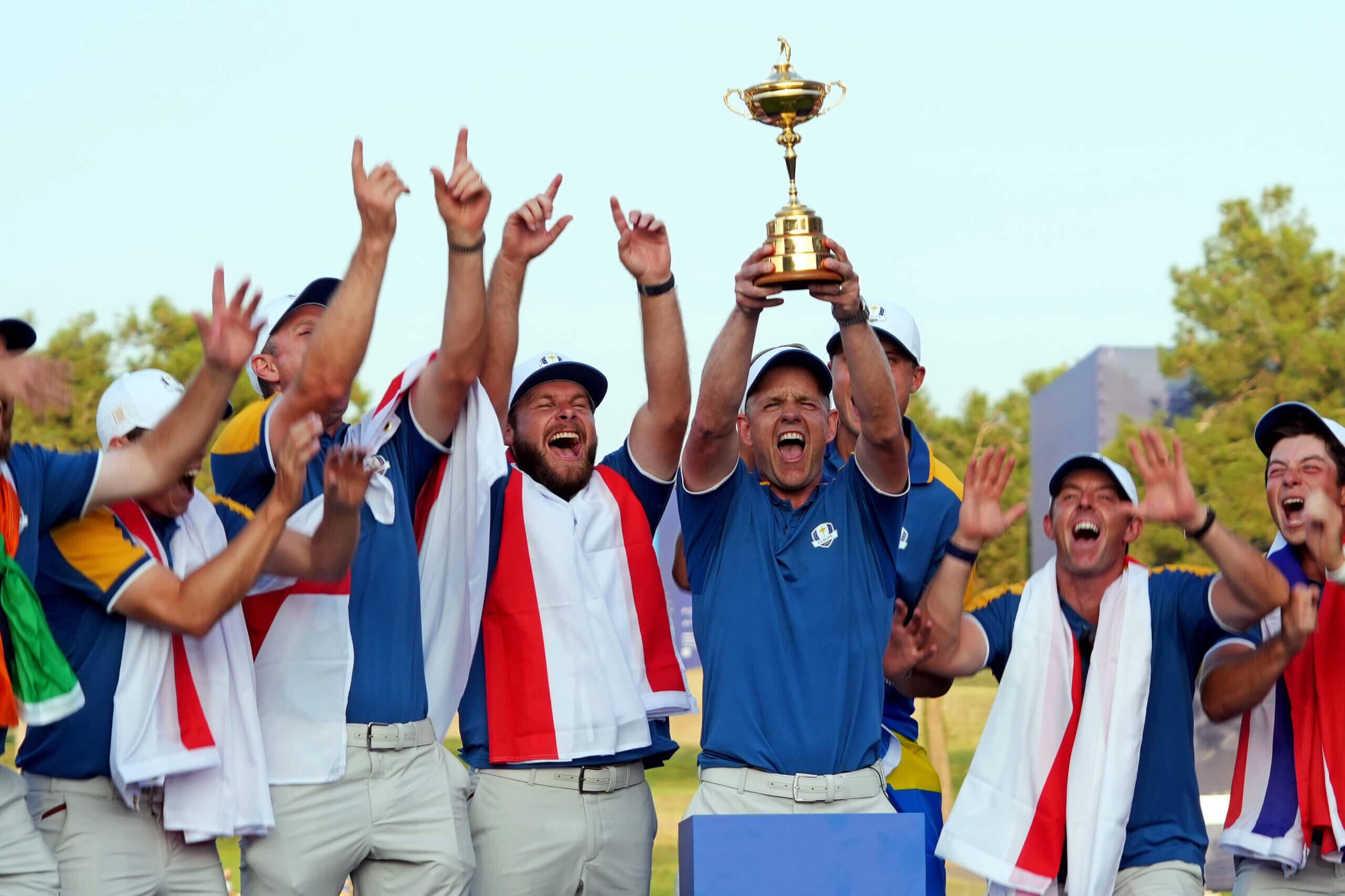
Europe has reconsidered its captaincy protocol after Luke Donald’s success. (Kyle Terada / USA Today Sports)
Donald’s and McGinley’s research led them to a variety of insights, but one in particular stood out early in the process: Rookies perform poorly when playing away from home. According to McGinley, the away template involved crafting a qualification system that would produce an experienced 12-man roster.
“The odds were stacked in the favor of experience in terms of formulating our team,” McGinley said. “It’s not a coincidence that we got 11 of the 12. But at the same time, there was an opportunity for a rookie to come through. Rasmus Hojgaard took that.”
Donald also implemented a new strategy of communication with European players, both those who had all but guaranteed their spot on the team, and those who were fighting for captain’s picks. Fifteen months ago, Donald began communicating with a group of 35 to 40 players. The group narrowed as the cup approached. However, the players on the fringes were very much part of the process — a method that not only prioritized this Ryder Cup, but also future ones.
“The players love clarity,” Donald said. “They’re very routine-oriented, so I tried to make sure that they had it very clear in their mind what the plan is, and how we’re going to win.”
Donald started the road to Bethpage with a blank playbook. And he could do that because of the history, because of where Donald started before Rome and where he is now.
At the beginning of his first captaincy, Donald addressed a group of European players at the Team Cup, a match-play style event designed to mimic the Ryder Cup, formerly known as the Seve Trophy, in Abu Dhabi. Despite being the driving force behind bringing the event back and his position as Ryder Cup captain, Donald spoke hesitantly. He just hadn’t settled in yet.
“He was a bit tongue-tied,” McGinley said. “To see where he was there, and less than 12 months later to see how confident he was addressing the team in Rome, there’s no doubt that won the heart.”
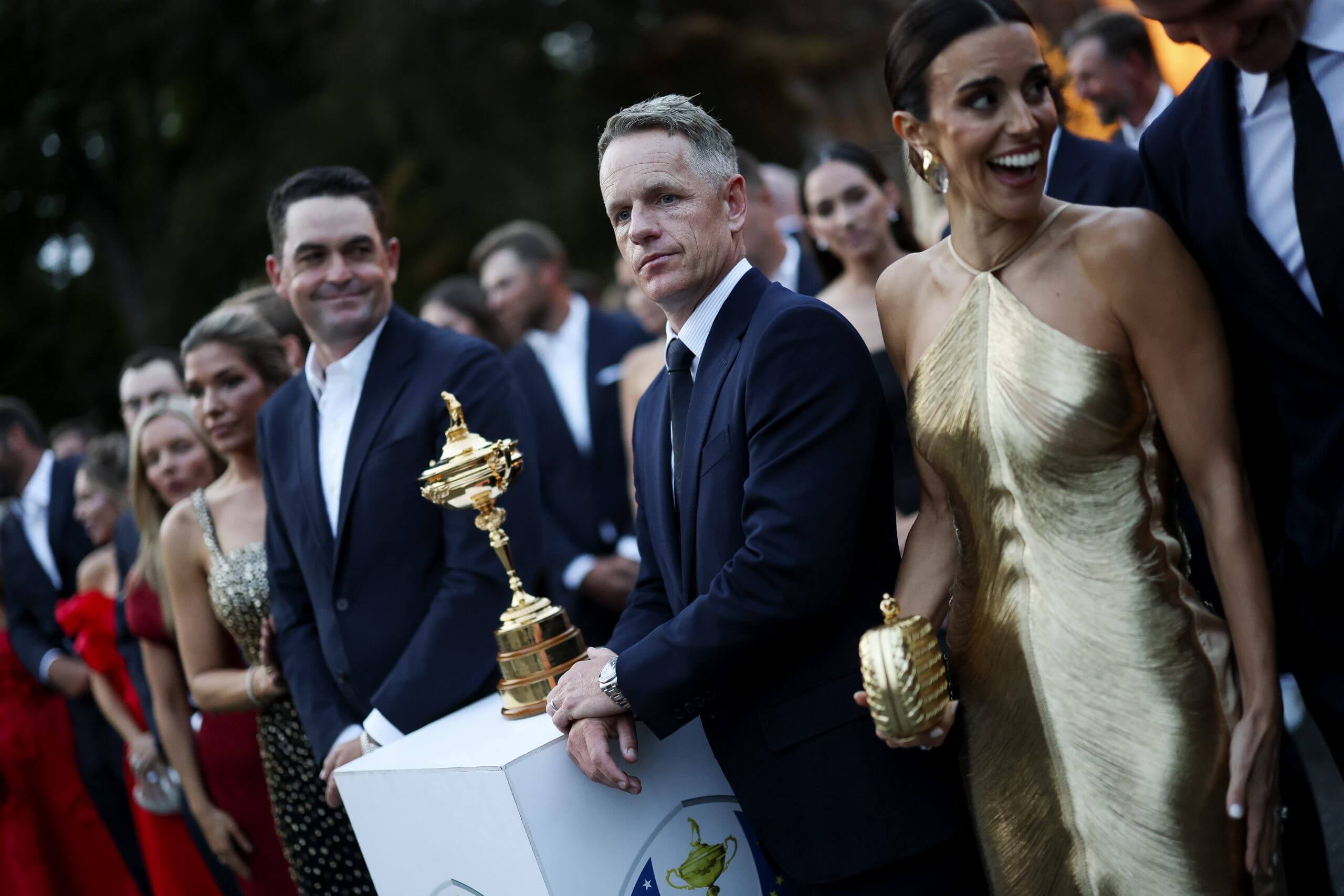
Luke Donald has become comfortable with all eyes on him. (Carl Recine / Getty Images)
Things couldn’t look or feel more different for Donald now. He gave a full speech in Italian at Marco Simone. He answers the media like a seasoned politician. And his voice commands the team room with the quiet confidence that the European Ryder Cup leadership knew he always had in him somewhere. Donald’s introverted personality made him a malleable captain by nature. He came into the role willing to learn — and willing to grow with an ever-adapting team.
“Sometimes the person who learns the most is not the student, it’s the teacher,” Donald says. “I think that’s how I’ve sort of approached it, just immersing myself into so much stuff that hopefully I’m passing along enough good stuff to these guys.”
Donald’s appointment as a repeat captain made sense for this very reason.
During this Ryder Cup, continuous learning was built into the plan with continuity as the fundamental backbone. Donald is experimenting. But those 12 men — and the greater European Team community — trust him because they’ve seen it before.
Winning an away Ryder Cup is a tall task, especially at a venue as raucous as Bethpage Black. Still, if Donald’s ethos continues to translate and his template goes to plan, he could accomplish something that would require his name to be etched in the event’s history books. And perhaps it could spark even more change.
“Maybe Ryder Cup Europe looks at it going forward: Do they give the captain a four-year term? I don’t know,” said Shane Lowry. “Obviously, it has to be successful the first time.”
(Top photo of Luke Donald: Carl Recine / Getty Images)

